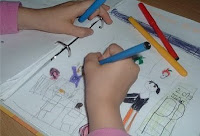Infocop share the publication has been done on children and future based on a study by the Fundación La Caixa. Again, this confirms that kids today are not like we were years ago. The social, structural, educational, etc. Have a clear impact on their development. It should be stressed that to put all our effort to enhance the beneficial influence of the same and in mitigating the negative aspects that may have consequences harmful in the future.
Social Work Foundation La Caixa has edited a new volume of his collection Social Studies, entitled Children and Future. New Realities, New Challenges, authored by Pau Marí-Klose (University of Barcelona), Marga Mari-Klose (University of Barcelona), Elizabeth Cowgirl (University South Florida) and Soveig Argenseanu Conningham (Emory University, Atlanta).
This work has been carried out in order to analyze the impact that certain social transformations of great significance -As the emergence of new types of families or new models of maternity and paternity, among others, are having on children's lives and development of English children, with special attention to the possible influence of these new styles in pediatric and adolescent development about the emergence of problems of obesity, and related socio school. To this end, we have performed an exhaustive survey of 2,200 parents of English children aged between 0 and 10 years.
This research was divided into three parts. The first discusses in a very comprehensive changes have occurred at a social level and can potentially be influencing the quality of life and welfare of children. The second part reviews the contexts in which today relate and socialize the children, both family type as those related to children's entertainment. Finally, this publication addresses the influence of these social factors that have been discussed in previous chapters (household structure, socioeconomic status, parenting styles, use of school time, etc..) Have on the health status English children, with special attention to the problem of obesity, social-emotional competence symptoms related to school alienation.
Among the conclusions of interest to psychology include:
- One of the most common causes of stress at home are the difficulties of parenting, because lack of personal time to relax or switch off (63%), the division of housework (49%) or childcare (28%). These tensions are more common in families where there is a low involvement of fathers in childcare
- In this study, we see a change in models of fatherhood and motherhood, especially following the adoption of the Equality Act (2007). Approximately 44% of the parents develop a parenting style "responsible", but still fairly low percentage of parents whose style is "intense" or based on shared responsibility with the mother (6.7%
-36% of parents admit to having given a slap their children in the last week. However, significant differences in the use of corporal punishment in relation to the time parents spend with their children and activities they undertake. Thus, those Parents who try to spend quality time with their children and engage in interactions that aim to stimulate intellectual level rely less on this type of punishment that parents who recognize tensions in the family due to lack of time or disagreement the patterns of parenting.
- In this line, those families who devote time to their children's cognitive stimulation (eg., Reading a bedtime story, etc.) Facilitates the promotion of learning that encourage academic success of their children.
- The results of this is in regard to problems related to being overweight or obese are also of great interest, since 12% of children aged five to ten years have obesity, and of these, 5% , submitted morbid obesity. Likewise, character constantan social and family variables that increase the risk of this health problem: lower level of educational resources, parents with overweight or obesity, immigrant families or traditional breeding pattern (only the mother is involved in that nurture).
Families in which parents spend quality time with their children provided that their children are less vulnerable to such social-emotional disorders. By contrast, in households with stressful situations are common, the risk of these disorders is higher.
- In terms of different socio-type problems, the survey highlighted the presence of concentration problems in school (31% of boys and 19% of girls aged between five and ten years), difficult to follow a course (18% of boys and 14% of girls) or little taste for the study (25% of boys and 15% of girls).
Such studies are of enormous importance. In most developed countries, without doubt, the quality of life and welfare of children has come a long way, thanks to the eradication of child mortality almost entirely and control of diseases of childhood. However, there are still many challenges to achieve, especially those related to psychological and social factors of risk and protection for these children. As literally stated in the presentation of the study "Children of today are the adults who will shape tomorrow's society. Therefore, the child care is crucial not only to ensure their welfare present but also to deal with security and prevent possible future problems that may have its genesis in early moments of life.
Reference:
Marí-Klose, P., Marí-Klose, M., Cowgirl E. and Conningham, SA (2010). Children and Future. New Realities, New Challenges. Barcelona: Obra Social La Caixa Foundation.


0 comments:
Post a Comment